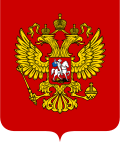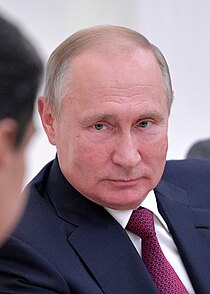President of Russia
| President of the Russian Federation
Президент Российской Федерации | |
|---|---|
 Russian Coat of Arms | |
 Russian presidential standard | |
| Governance of Russia Executive branch in Russian Politics | |
| Style | Mr. President (formal) Comrade Supreme Commander (among the Military) His Excellency [1] (diplomatic) |
| Status | Federal Head of State |
| Member of | State Council Security Council Supreme Eurasian Economic Council |
| Residence | Kremlin Senate (working) Grand Kremlin Palace (ceremonial) Novo-Ogaryovo (residential) |
| Seat | Moscow Kremlin, Moscow |
| Nominator | Political parties or self-nomination |
| Appointer | Direct popular vote |
| Term length | six years, renewable once |
| Constituting instrument | Russian Constitution |
| Precursor | President of the Soviet Union Chairman of the Presidium of the Supreme Soviet of Russian SFSR |
| Formation | 1991
|
| First holder | Boris Yeltsin as first President of the Russian Federation (10 July 1991) |
| Salary | 3.6 million rubles annually |
| Website | президент.рф (in Russian) eng.kremlin.ru (in English) |
The President of Russia is the head of state and head of the executive of the central government of Russia and the commander in chief of the Russian Armed Forces.
The current president is Vladimir Putin. Boris Yeltsin was the first president of Russia, Vladimir Putin was second and fourth, and Dmitry Medvedev was the third. The President's duties are listed in the 1993 Russian Constitution. The president directs the foreign and domestic policy of the Russian Federation.
The first inauguration took place on 10 July 1991 following the collapse of the Soviet Union. Mikhail Gorbachev having to resign sealed the fate of the Soviet Union. The Russian Soviet Federative Socialist Republic became the Russian Federation.[4]
Inauguration of the President of Russia is done six years after the last inauguration (since 2000, this 7th of May).
In case of the President's death, resignation or removal from office, the Prime Minister serves as acting president until a replacement is appointed.
List of presidents[change | change source]
| Number | Image | Name | Term of office | Length of term |
|---|---|---|---|---|
| 1 | 
|
Boris Yeltsin (1931-2007) |
July 12, 1991– December 31, 1999 (resign) |
8 years, 174 days |
| 2 | 
|
Vladimir Putin (b. 1952) |
December 31, 1999– May 7, 2008 | 8 years, 128 days |
| 3 | 
|
Dmitry Medvedev (b. 1965) |
May 7, 2008– May 7, 2012 | 4 years, 0 days |
| (2) | 
|
Vladimir Putin (b. 1952) |
May 7, 2012–present (mandate expires on May 7, 2024) |
11 years, 356 days |
Living former Presidents[change | change source]
As of April 2024, one former president is alive:
| Image | Name | Term of office | Age |
|---|---|---|---|

|
Dmitry Medvedev | 2008–2012 | 58 years, 226 days |
The most recent president to die was Boris Yeltsin, who died on April 23, 2007.
References[change | change source]
- ↑ "UNITED NATIONS HEADS OF STATE HEADS OF GOVERNMENT MINISTERS FOR FOREIGN AFFAIRS Protocol and Liaison Service" (PDF). Archived from the original (PDF) on 2012-09-27. Retrieved 2012-11-16.
- ↑ RSFSR Law "On President of the Russian SFSR
- ↑ RSFSR Law on amendments to the Constitution of the RSFSR
- ↑ "Collapse of the Soviet Union". HISTORY. Retrieved 2022-02-24.

